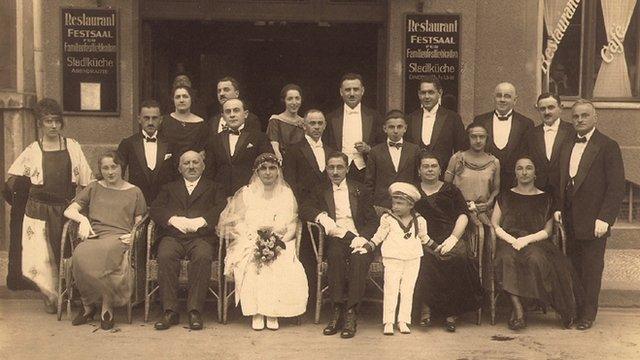Jewish community in 'decline' and 'feeling vulnerable'
- Published
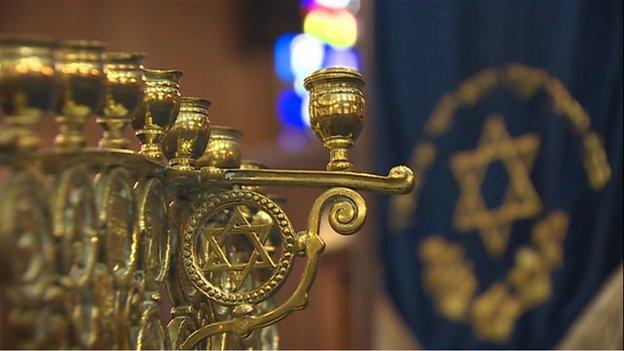
Cardiff still has an Orthodox and Reform synagogue, although Newport's congregation is dwindling
It is a religion dating back hundreds of years in Wales, but now there are concerns about the declining number of Jews in the country.
Cardiff's synagogues are looking at ways of attracting more Jewish people to the city, while in Newport there are just six members of the community left.
It comes at a time when Jews across Europe have spoken of concern after attacks in Paris and Copenhagen.
And it is a vulnerability that is felt in Wales too.
Stanley Soffa, chairman of the Jewish Representative Council for South Wales, said: "There is the fear of the person who will do something unpredictable, it could just be a comment in the street, it could be desecration of a cemetery, it could be daubing something on a synagogue, it could, of course, be much more serious than that."
He added: "We do not fear action such as we've seen in Paris, but we have to be vigilant and careful. It only takes one person to pull a knife and to stab another and so we don't want people to put themselves in a difficult position if they can help it. Security has obviously increased and the police have been very good."
Stanley Soffa believes the community is in decline for a number of reasons
Figures released last month showed the number of anti-Semitic incidents in the UK reached the highest level ever recorded.
The Community Security Trust, a Jewish security charity which runs an incident hotline, recorded 1,168 anti-Semitic incidents against Britain's 291,000 Jews in 2014, against 535 in 2013.
Although Mr Soffa said he did not know of any Jewish families living in Cardiff who are now considering leaving because anti-Semitism, he added there was a still concern that something could happen.
"We have to be vigilant we have to be careful, we shouldn't do anything that is going to draw attention to ourselves. We have just got to be watchful."
The Jewish community was officially first recognised in Cardiff in 1840 when the Marquess of Bute gifted them some land in Highfields for a dedicated cemetery.

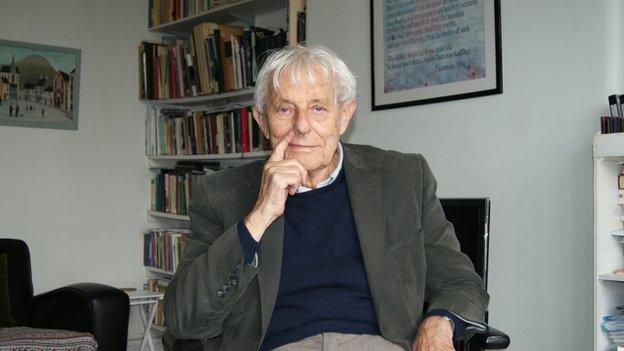
Dannie Abse died in 2014 and often drew on his Jewish roots when writing
Prominent Welsh Jews
Michael Howard - the former Conservative leader is the son of a synagogue cantor who moved from Transylvania to Llanelli in the 1930s
Dannie Abse - the poet and doctor, who died last year, grew up in Cardiff and often drew on his Welsh and Jewish roots in his writing
Bernice Rubens - the Cardiff-born Booker Prize-winning novelist died in 2004. Her writing reflected life in the tight-knit, immigrant Lithuanian-Jewish community where she grew up
Karel Lek - the Anglesey painter fled to Britain with his Jewish family from Belgium in 1940. His mother lost nearly all her family in the Holocaust, but his father held Belgian-British citizenship because Karel's great-grandfather had spent six years in London cutting the diamonds for Queen Victoria's new crown

But despite initially thriving, according to the most recent census there are now just 2,064 Jews living in Wales, external.
Mr Soffa said: "At one time every Valley community had their Jewish congregants. Newport, Swansea and Cardiff are the only ones remaining. Newport is small, Swansea is getting smaller, Cardiff is the biggest.
"When I look to the future I see decline, I see Newport and Swansea virtually ended like Merthyr did a few years ago."
The synagogue in Newport dates back to 1859. In the 1970s, there were about 150 members, but numbers dwindled and now just six remain.
"It's very sad not to have enough people, it's one of those things," said Abraham Davidson, 81, former congregation president.
"The community has shrunk and unfortunately Jewish people cannot have services without 10 men - it has got to be to men unfortunately, because we're still old fashioned but those are the rules."

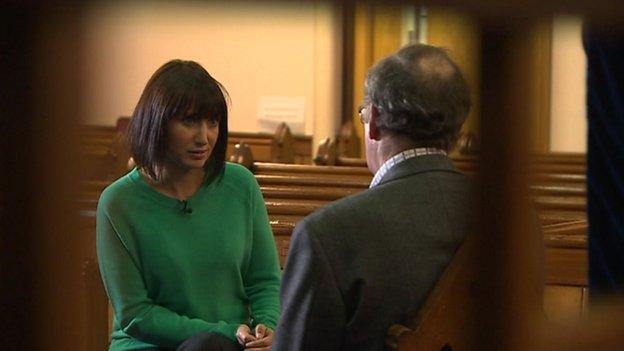
Revisiting roots
Television presenter Lucy Owen's father was the first boy to have a Bar Mitzvah at Cardiff's Reform Synagogue.
There are letters from her grandfather Myer Cohen to Leslie Corne - one of the leaders of the community - confirming 133 people would attend the event in March 1949 and there would be a reception at the Angel Hotel.
She recalled how she used to visit the reform synagogue in Cardiff with her grandfather when she was a teenager and said it was difficult returning there three decades later.
"He was instrumental in founding the synagogue in the years after the Second World War," she said.
"He had fallen in love and married a Christian woman, and could no longer be an Orthodox Jew. There were others like him, and the Cardiff Reform Synagogue was established.
"Returning there 30 years on was hard for me. Both my grandfather and father have now died, and memories of them and my time spent at the synagogue came flooding back.
"To see this community that had been so important to my family, now feeling vulnerable was very difficult.
"And there was guilt too. My parents left it for me to choose my religion. Despite those early visits to the synagogue, I didn't become a practicing Jew.
"I now question whether it's stories like mine that are partly responsible for the dwindling community here in Wales."
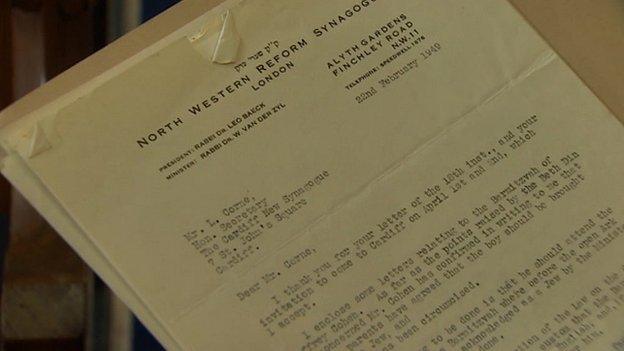
Letter about Lucy Cohen's father's Bar Mitzvah

Even though Cardiff is the largest Jewish community remaining in Wales it has gone from having 5,500 members in the 1960s to less than 500 now.
Mr Soffa said the community are hoping to quell the tide of people leaving and boost their numbers.
He said: "There are a lot of Jews, according to the census at least, in Cardiff and the Vale who are clearly not members of either of the two Cardiff synagogues. We are trying to find out who they are, trying to find out why they are not members of a synagogue and trying to encourage them to join. That is the only way we can increase our numbers."
Prof Nathan Abrams from Bangor University specialises in European Jewish diasporas. He believes it is hard for smaller Jewish communities to retain their members.
"I think the main reason for decline is the older people who are dying are not being replaced by incomers. There are not enough economic opportunities to attract people, and those who grown up in a community think there is not enough reason for them to stay, particularly if they want a Jewish influence on their children, or want them to marry other Jews or go to a Jewish school.
"These people are going to have to go to a bigger community such as London or Manchester where the infrastructure for this is."
- Published9 February 2015
- Published11 September 2012
